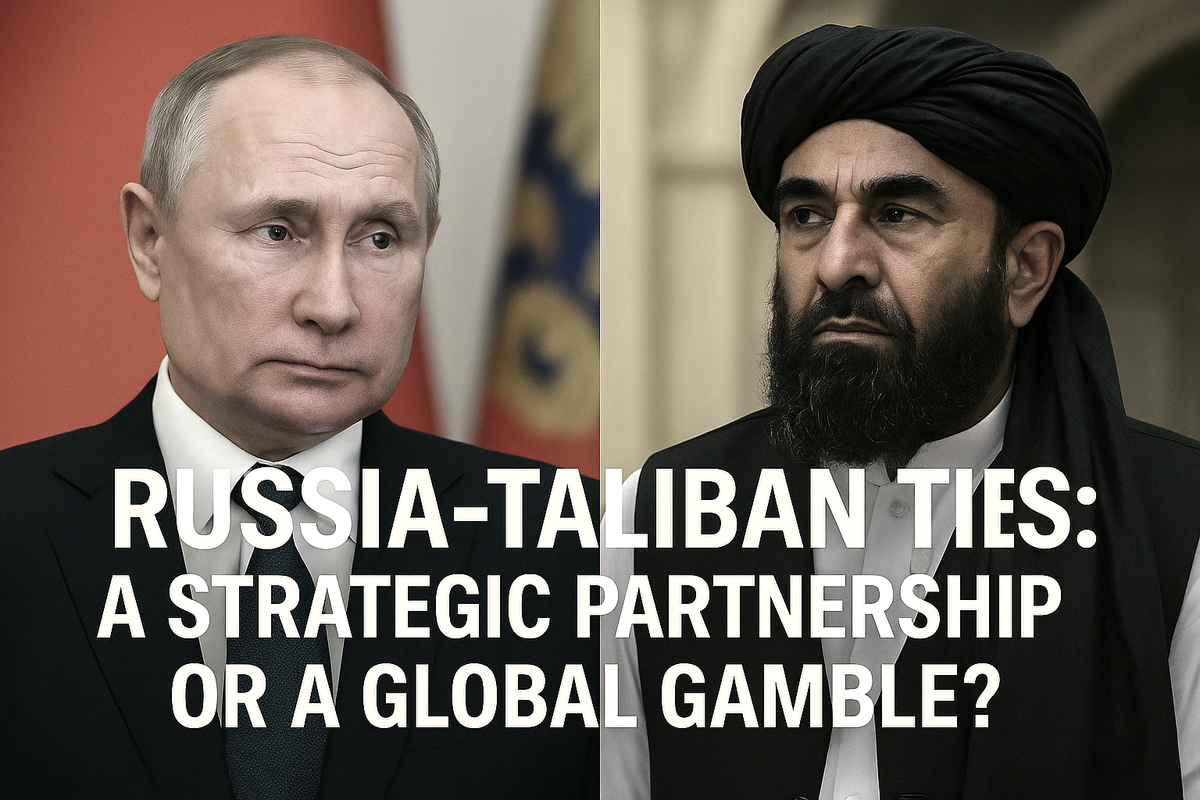Russia Becomes Taliban’s First Friend: Is This the Start of a Diplomatic Domino Effect?
Russia becomes the first major power to officially recognize the Taliban regime in Afghanistan, triggering potential diplomatic shifts across Asia. What does this mean for global alliances, counterterrorism, and regional security?

MOSCOW, July 4, 2025
In a major shift in global diplomacy, Russia has become the first significant country to officially recognize the Taliban as the legitimate government of Afghanistan. This move breaks with two decades of Western isolation against the Islamist group and raises important questions about Russia’s intentions, the global war on terror, and the future of world order.
The recognition is not merely symbolic. It could create a chain reaction across Asia and the Middle East, drawing both allies and adversaries into a new geopolitical arrangement. With one decision, Moscow has shown it is ready to change the diplomatic landscape, possibly reshaping regional alliances and global views on legitimacy.
From Enemies to Allies: A Brief History of Russia-Taliban Relations
To grasp the significance of this decision, it’s important to consider the long, violent history between Russia and the Taliban.
In the 1980s, Soviet forces fought U.S.-backed Mujahideen fighters in Afghanistan. Many of these fighters would later become the Taliban. This conflict was disastrous for Moscow and played a key role in the Soviet Union's collapse. However, after decades, shared interests have outweighed old hostilities.
“In geopolitics, there are no permanent enemies, only permanent interests,” notes Fyodor Lukyanov, Chairman of Russia’s Council on Foreign and Defense Policy.
In the past five years, Russia has hosted several Taliban delegations in Moscow to discuss economic and counterterrorism matters privately. With U.S. troops withdrawn and NATO stepping back, Russia has taken the chance to fill the void.

Why Now? Decoding Russia’s Strategic Motives
Counterbalancing the West
With the war in Ukraine ongoing and Western sanctions increasing, Russia wants to expand its influence. Recognizing the Taliban is one way to challenge the U.S.-led international order and its control over diplomatic legitimacy.
Security in Central Asia
Russia is concerned about the rise of ISIS-K and drug trafficking along its southern borders. A stable Taliban government could help prevent extremism from crossing into Tajikistan, Uzbekistan, and Turkmenistan, all former Soviet republics.
Access to Rare Resources
Afghanistan has large mineral resources, including lithium, which is vital for electric vehicle batteries. Moscow aims to take advantage of energy and mining deals while sidelining Western companies.
Realpolitik and Leverage
By recognizing the Taliban, Russia gains diplomatic leverage, which could help ensure cooperation on counterterrorism, arms control, and regional intelligence.
The Domino Effect: Who Might Follow Russia?
Moscow’s decision may encourage other regional powers, who have been quietly engaging with the Taliban, to also recognize them.
China
China signed a $540 million oil extraction deal with the Taliban in 2023. Considering China’s Belt and Road Initiative goals, it might formalize recognition to secure trade routes and mineral rights.
“Stability in Afghanistan is essential for Xinjiang’s border security,” said a Chinese foreign affairs analyst quoted in the South China Morning Post.
Iran
Despite past tensions, Iran has practical reasons to recognize the Taliban, such as border security, trade, and reducing U.S. influence in the region.
Pakistan
Long criticized for sheltering Taliban leaders, Pakistan may soon pursue formal recognition to protect its strategic interests and influence over Afghan politics.
Turkey and Qatar
Both countries, which hosted U.S.-Taliban peace talks in Doha, might adjust their positions to stay relevant as mediators in a new diplomatic climate.

What This Means for the Taliban’s Global Standing
Diplomatic recognition brings significant legal, financial, and political consequences:
- It legitimizes the Taliban on the world stage, granting them rights under international law.
- They might reclaim frozen assets held in U.S. and European banks, estimated at over $9 billion.
- They can sign trade agreements, receive foreign aid, and negotiate loans from international organizations like the IMF or World Bank if others follow Russia’s example.
- Most importantly, it allows them to portray their victory as not only military but also diplomatic, further solidifying their hold on power.
However, this recognition risks empowering hardliners and silencing domestic opposition, particularly among women and ethnic minorities.

Will Legitimacy Lead to Reform?
Some argue that international legitimacy can help moderate the Taliban, making them more accountable to global standards. But critics see this as naïve.
Since regaining power in 2021, the Taliban have:
- Banned girls from secondary and higher education
- Shut down independent media outlets
- Restricting women from public spaces
- Resumed public executions and amputations
“Russia’s recognition rewards repression, not reform,” said Heather Barr of Human Rights Watch.
Reactions from the World
United States
The Biden administration condemned the move, calling it “premature and counterproductive.” Secretary of State Antony Blinken cautioned that this could “normalize violent extremist governance.”
European Union
The EU echoed these concerns and reiterated that human rights conditions must be met before any recognition is granted.
India
India, which has economic and security interests in Afghanistan, remains cautious but resolute in withholding recognition. Analysts suggest India views Taliban recognition as a potential threat to the security situation in Kashmir.
United Nations
UN officials voiced worries about the precedent being set. The Taliban’s seat in the General Assembly remains unfilled.
Muslim World
Responses have varied. Saudi Arabia and the UAE are still considering their positions. Qatar, having hosted Taliban leaders for years, has not formally recognized them.

The Legal and Diplomatic Stakes
Legally, recognition from a UN Security Council member like Russia puts pressure on international organizations to reconsider their stance.
Financially, it could:
- Improve Taliban access to international banking systems
- Speed up bilateral trade agreements
- Undermine multilateral sanctions
Symbolically, it sends a message to governments everywhere: Power alone can grant legitimacy, regardless of democratic values or human rights compliance.
Final Reflection: Diplomacy or Dangerous Precedent?
Russia’s recognition of the Taliban marks a significant moment in 21st-century geopolitics. It is a calculated risk aimed at stabilizing Russia’s southern borders, projecting influence, and challenging Western dominance.
But at what cost?
“This risks undoing decades of progress,” warned Malala Yousafzai in a recent interview. “Afghanistan’s women and girls are being erased. Recognition gives power without responsibility.”
If other countries follow Russia’s lead, it could change the global order while also legitimizing regimes that rule through fear and fundamentalism.
Your voice
Should international recognition be based on real-world conditions or ethical values? Where should we draw the line when it comes to legitimizing controversial governments?
Sources
- Reuters – Provided official reporting on Russia’s diplomatic accreditation of the Taliban envoy and images of the Taliban-Russia meetings. (reuters.com)
- Deutsche Welle (DW) – Quoted Russian geopolitical analyst Fyodor Lukyanov and used for context on realpolitik motives. (dw.com)
- Human Rights Watch – Source of quote from Heather Barr on the Taliban’s human rights record and gender repression. (hrw.org)
- Al Jazeera – Used for detailed reports on country reactions and provided multiple high-quality images of ambassador credentialing. (aljazeera.com)
- NPR & AP News – Offered photos of Taliban flag ceremonies and celebrations in Kabul, used in a visual narrative of regime consolidation. (npr.org) (apnews.com)
- CNN – Provided insights and reporting on China’s economic interests in Afghanistan, including the 2023 oil deal. (cnn.com)
- The Moscow Times & PressTV – Offered primary coverage of official Russian statements and images of the Kabul-Moscow delegation handovers. (themoscowtimes.com) (presstv.ir)
- Wikimedia Commons & Wikipedia – Used for the map image showing global embassies and consular representation in Afghanistan as of 2025. (commons.wikimedia.org) (en.wikipedia.org)




